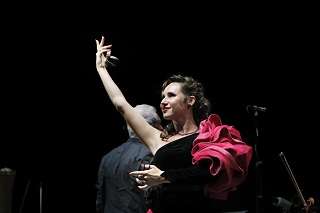|
Back
The Captivating Kataeva Pesaro
Teatro Sperimentale
08/20/2023 -
Gioachino Rossini: Tancredi: Sinfonia, Recitativo “Oh patria!” e Cavatina “Tu che accendi questo core... Di tanti palpiti” – La Cenerentola: Rondò “Nacqui all’affanno, e al pianto”
Vincenzo Bellini: I Capuleti e i Montecchi: Sinfonia & Cavatina “Se Romeo t’uccise un figlio”
Wolfgang Amadeus Mozart: La clemenza di Tito, K. 621: Overture & Aria “Parto, ma tu, ben mio”
Georges Bizet: Carmen: Suite No.1 (arr. Ernest Guiraud), Habanera “L’amour est un oiseau rebelle” & Chanson bohème “Les tringles des sistres tintaient”
Gerónimo Giménez: La boda de Luis Alonso: Intermédio & Canción espanola “De Espana vengo”
Maria Kataeva (mezzo)
Filarmonica Gioachino Rossini, Marco Mencoboni (conductor)

M. Kataeva (© Amati Bacciardi Studio)
In addition to a stimulating program of rarely performed operas, Pesaro’s Rossini Opera Festival presents a series of concerts with prominent Rossini singers. The only solo concert with an orchestra was that of the sensational Russian mezzo Maria Kataeva.
The timbre of Maria Kataeva’s voice is an interesting one: dark, distinct and beautiful. The selections in the concert were varied and showed the Russian mezzo’s versatility and linguistic abilities. The concert opened with two popular Rossini arias, “Di tanti palpi” from Tancredi and “Nacqui all’affanno” from La Cenerentola. The first aria was slightly tepid, but she was certainly “on” for the second aria. Her coloratura was polished, and as the voice warmed up, it revealed its distinct colour and natural trills.
The most beautiful and moving moment of the concert was Sesto’s aria “Parto, parto, ma dovè?” from Mozart’s La clemenza di Tito. Kataeva was able to seduce with her beautiful timbre in the Rossini arias, and she really impressed with the depth of her interpretation in the Mozart aria showing Sesto’s torment. The audience was exuberant following that aria and extremely generous with their applause.
Exuberance was on the menu with Carmen’s Habanera, where she showed her ability to portray a seductive but mercifully not vulgar Carmen, a trap many singers fall into. Her diction in French was exemplary, no easy feat for most. The second aria from Carmen, “Les tringles des sistres tintaient”, was more appealing as Kataeva didn’t try too hard and was more natural. In between the two arias, the orchestra played the rather long Carmen Suite No.1. Though the music is lovely, it was a rather long affair in the context of a vocal concert.
The program ended with zarzuela music and Spanish songs. Kataeva impressed with her diction in Spanish and her interpretation, though the Rossini loving public would have likely preferred more bel canto.
One suspects that this concert is a prelude to an upcoming collaboration with the Rossini Opera Festival. Given Kataeva’s beautiful voice and stage presence, it would be most welcome.
Maria Kataeva’s Website
Ossama el Naggar
|